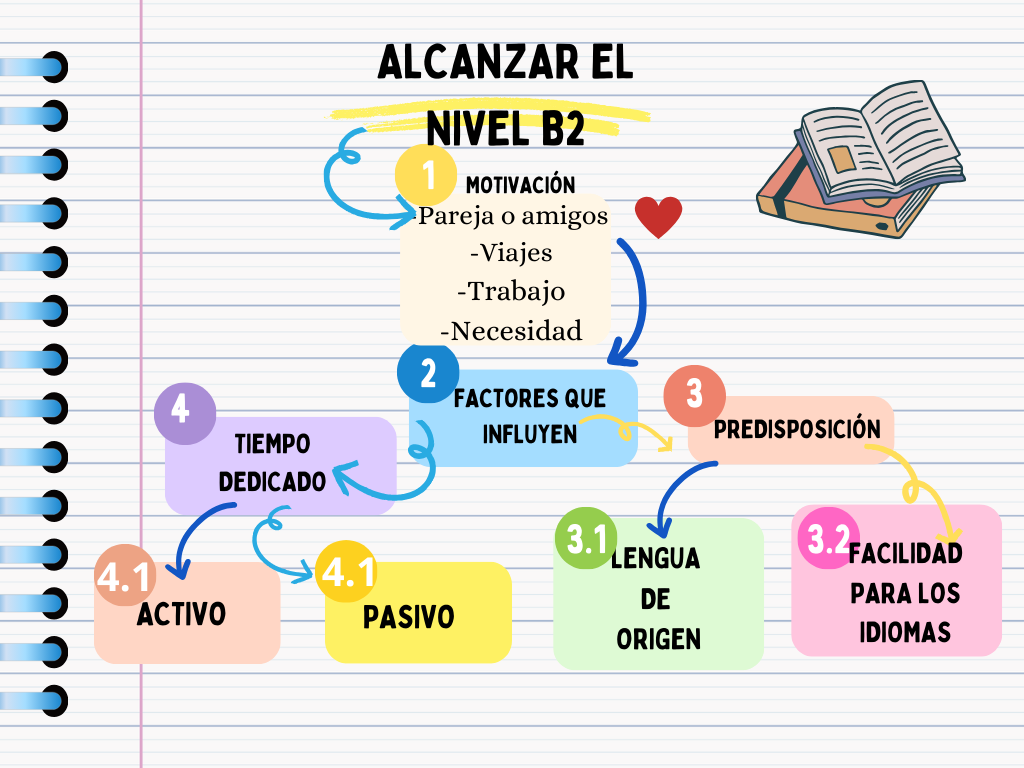On many occasions, you ask us the same question: How long do I need to achieve the B2 level of Spanish? Actually, it is not an easy question to answer.
Luis Vives Escuela de Español is a Center Accredited by the Cervantes Institute for teaching Spanish. Thousands of students from all over the world have learned Spanish with us for more than 20 years. And yet, after so much experience teaching Spanish, we cannot give you a definitive answer to the question, because it depends on different factors.
What factors influence improving my Spanish and reaching level B2?
Learning Spanish is divided into three levels, each divided into two:
- Level A: A1 (basic) | A2 (beginner)
- Level B: B1 (intermediate) | B2 (independent)
- Level C: C1 (advanced) | C2 (competent)
If you are wondering How long does it take to reach the B2 level of Spanish?, you should know that your options for improving your command of the Spanish language will depend on your attitude towards new learning, the time you can allocate to it and also your origin.

How much time are you going to dedicate to it?
Obviously, the more time you dedicate to something, the better your results will be. So if you start at an initial level (A1) and attend a course Spanish intensive (20 classes a week), you could reach level B2 in 6 months.
If you don't have that much time to learn, and you choose a course semi intensive (10 classes a week), you would achieve it in 10-12 months.
If Spanish classes are a complement to your academic or professional life and you attend an extensive Spanish course 4 hours or 6 hours weekly, it would take more than a year to go from level A1 to B2.
This is only an approximation, since the result is subject to other factors such as the student's origin or the time spent studying and learning outside of school.
Where are you from?
Of course, the student's native language is also important. People who speak Romance languages, such as French, Italian or Portuguese, will have an easier time learning Spanish because they all come from Latin and have considerable similarity at a grammatical and lexical level. On the other hand, normally a person whose mother tongue is Arabic or Chinese will have greater difficulty learning Spanish than a Portuguese or Italian. For this reason, it is very important that you look for the right place to start learning Spanish. What do you think about studying at our school? 😀
Are you going to do a cultural immersion?
It is not enough to just attend Spanish classes, it is essential to dedicate time outside of school hours. Hear podcast, read in Spanish, watch Spanish series and movies, make Spanish-speaking friends or get a boyfriend or girlfriend who speaks Spanish! All of this will undoubtedly help you improve your level because you will get used to being continually surrounded by the Spanish language.
What can you do to improve your Spanish? Tips to improve your Spanish
Apart from the recommendations mentioned in the previous section, we are going to leave you a list with more tips that can help you reach level B2:
- expand your vocabulary: A good way to do this is to learn a new word every day. Decide what word you would like to learn, look it up online and write it down on your vocabulary list.
- Pay attention to interference with your tongue: especially for Romance language speakers, in your Spanish learning you may encounter many “false friends”, so ask your teacher or search the web for lists of false friends between Spanish and your language.
- Remember to differentiate records: Is the situation formal or informal? Talking to your classmates is not the same as talking to a stranger on the street. It is important to take into account what grammatical and lexical differences you have to use in one scenario or another.
- Write a list of what aspects you would like to improve: pronunciation?, fluency?, lexicon?... To improve your level it is advisable to understand what your weak points are in order to improve them in class, of course, with the help of your teacher.
- Colloquial expressions: we use them constantly and you will also often hear them in movies, series and songs, so it is essential to familiarize yourself with them and take a look at our posts and reels of Instagram y TikTok, in which we talk about them.
Do you need a B2 to access a Spanish university?
In Spain, most universities require a minimum B1 level to apply for a place. In Madrid, public and some private universities are required to accredit a B2 level of Spanish within the UNEDasiss accreditation process.
If you are preparing to enter university (do you know that in Luis Vives We prepare the PCE UNEDasiss exams?) and you are looking for the best Spanish course to reach level B2, you have come to the right place: learn Spanish with our online or in-person course, and you will not regret it 😉
We hope that this article has helped you better understand what you need to reach level B2, and that you put into practice our recommendations to improve. Do not hesitate to contact us if you have other questions.


Good afternoon, I request information about the virtual Catalan course level B2.
Hi Claudia:
We are sorry but we do not currently offer Catalan courses.
A greeting.